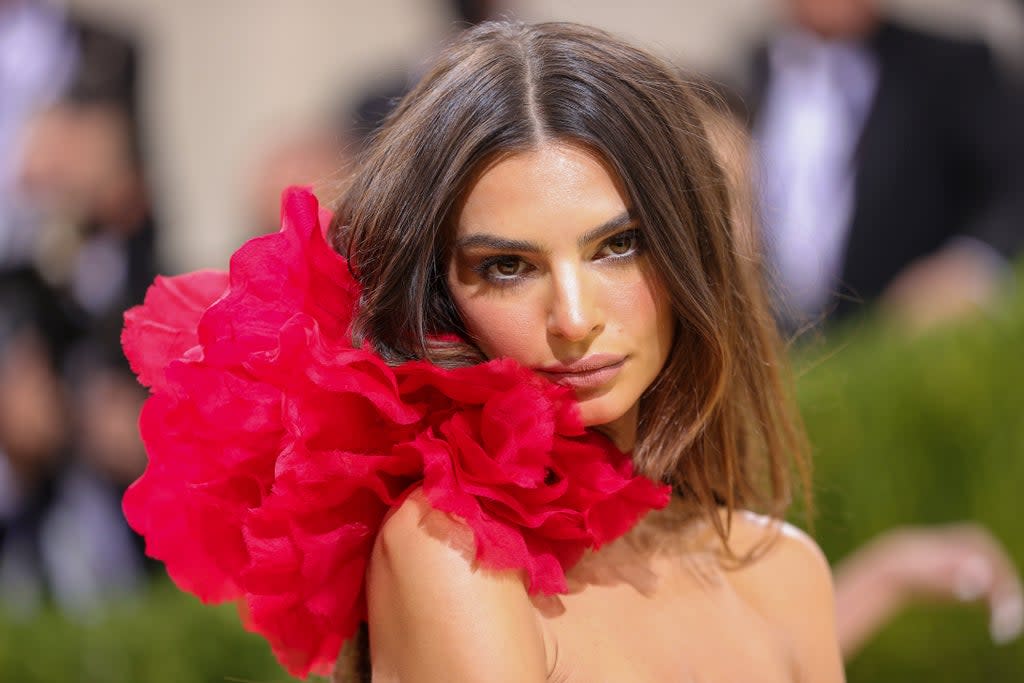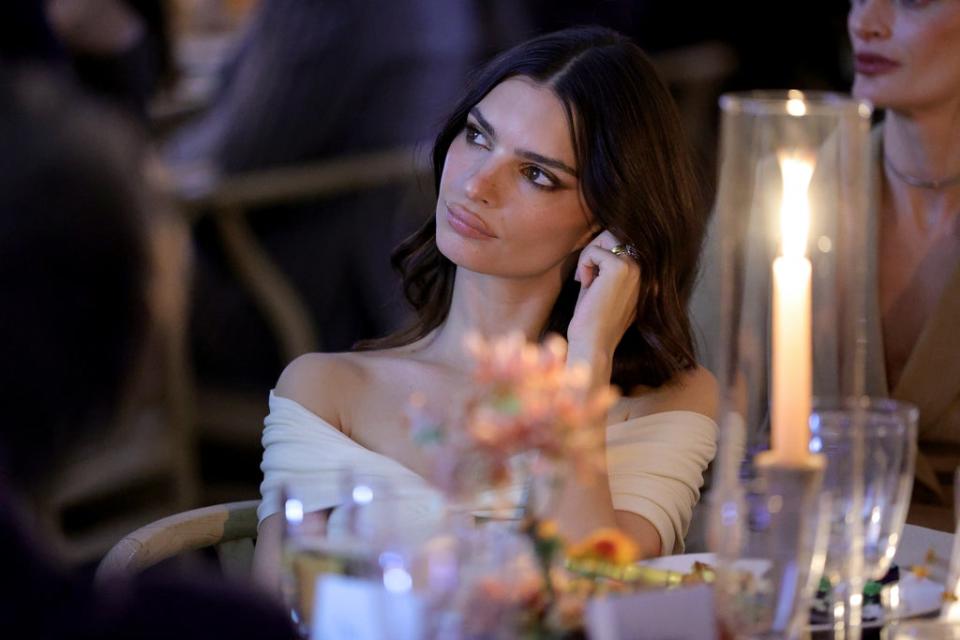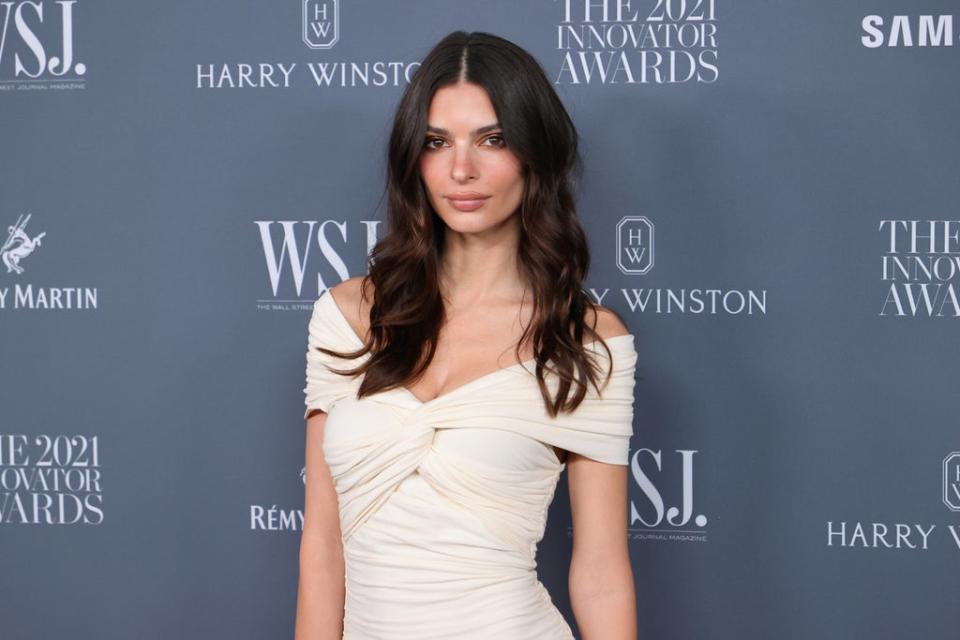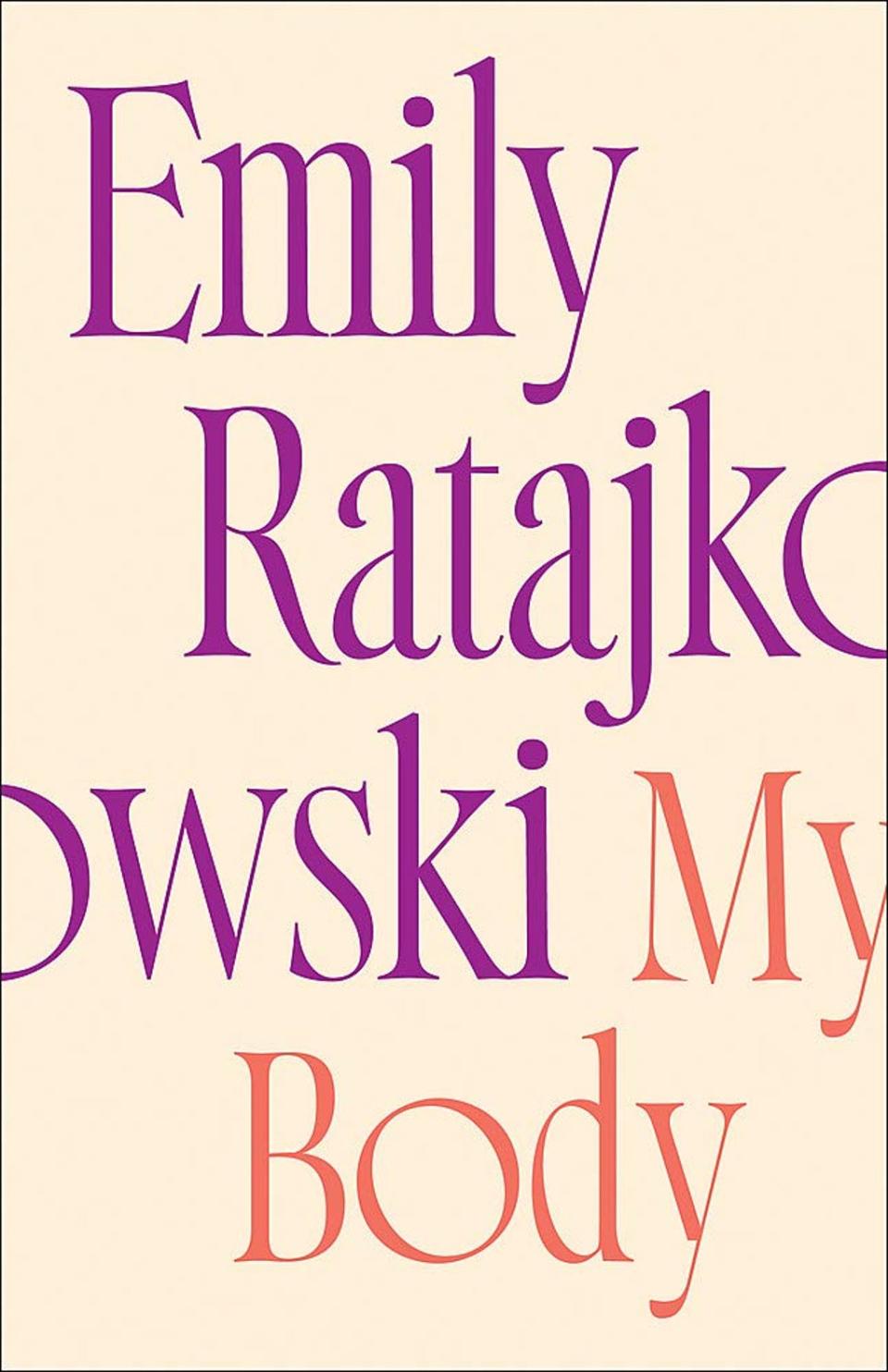Emily Ratajkowski: ‘I have learned that my image, my reflection, is not my own’

- Oops!Something went wrong.Please try again later.
- Oops!Something went wrong.Please try again later.
On a September morning in SoHo, the airy, light-filled Inamorata office is filled with women. Beside racks of bathing suits and “city sets” (matching crew necks and bike shorts bearing versions of the logo also found on the hand towels in the bathroom), they sit around communal tables, cooing over a baby.
Sylvester is the 8-month-old son of the apparel company’s founder and chief executive, Emily Ratajkowski. He and her giant husky mix, Colombo, are the only boys around.
“As you see, you’re in my safe space,” Ratajkowski says, sitting on a pink velvet couch facing the room where her team is tending to her child. “Having your own company, you’re the one who decides what the images are of your body that are going out in the world.”
Control is big for the supermodel. Ever since 2013, when she became famous for dancing semi-nude in Robin Thicke’s Blurred Lines music video, images of Ratajkowski have diffused across the internet. From David Fincher’s Gone Girl to paparazzi photos, from fashion ads to her own social media posts, her face is so ubiquitous she says she even gets tagged in tattoos.
In 2018, when she was at the height of a modelling career she thought would be temporary (she dropped out of UCLA in 2010 and needed the money), her mother, Kathleen Balgley, a former English professor, was diagnosed with amyloidosis, which caused a chronic, abnormal protein build-up in her hands.
Around then, Ratajkowski says, “I felt like something was really missing.” Alone in Los Angeles while her husband, movie producer Sebastian Bear-McClard, was working in New York, Ratajkowski began to write.
The resulting essays, collected in My Body, out from Quercus Publishing on 9 November, reveal a person whose politics and sense of self are very much in progress.
It’s almost like she’s a secret agent who infiltrated the beauty industry, reached its heights, and is now telling us what it’s like in unsparing terms
“They were written to try to figure out what I believed,” she says.
In the essay “Blurred Lines”, Ratajkowski returns to the set of a video that was criticised as degrading and even “rape-y”, and considers misogyny and her role in it. Back then she was 21 and found the experience “empowering”, she writes, a chance to embrace her sexuality on camera and use it to her advantage.
Now that she’s 30, she sees how naive she was.
“Whether you’re wearing a burqa or a bikini,” she says, “we’re operating in the very specific confines of a cis-hetero, patriarchal, capitalistic world.” (She adds: “I always freak people out when I use words like that, just as far as it’s, like, a little obnoxious.”)
It may not be especially radical to explore the power imbalance between the beholder and the beheld. But Ratajkowski, who has worked to amass a social media following in the tens of millions, comes to the subject with an unusually influential voice.
“It’s almost like she’s a secret agent who infiltrated the beauty industry, reached its heights, and is now telling us what it’s like in unsparing terms,” said Michael Schulman, the writer who moderated a conversation between Ratajkowski and comedian Amy Schumer at The New Yorker Festival last month.
But the industry has also infiltrated the secret agent. In the essay “Bc Hello Halle Berry”, Ratajkowski has an existential crisis about being paid to post a picture of her butt on a free vacation in the Maldives, writing: “I wanted to be able to have my Instagram hustle, selling bikinis and whatever else, while also being respected for my ideas and politics and well, everything besides my body.” She writes that her hypocrisy gives her a headache.

To earn that respect, Ratajkowski did her homework. In December 2019, she contacted author Stephanie Danler (Sweetbitter, Stray) asking for advice, and they became friends.
“She really taught herself how to write that book,” Danler says. “She just read nothing but non-fiction, book after book, in a kind of self-made MFA programme.”
Among Ratajkowski’s influences are Leslie Jamison’s The Empathy Exams (“obviously”), Lacy Johnson’s The Reckonings (“one of my favourite books and nobody knows it, which I just think is crazy”), Alexander Chee’s How to Write an Autobiographical Novel, and Lisa Taddeo’s Three Women.
Sara Bershtel, her editor at Metropolitan, says they signed a deal in the fall of 2020, shortly after The Cut published “Buying Myself Back”, an essay that is included in the book. In it, Ratajkowski recounted moments when she had seen photos and images of herself bought, sold and shared without her consent, including in one case by a photographer she had accused of sexual assault. It was the magazine’s most read piece of the year.
“I have learned that my image, my reflection, is not my own,” she wrote.
The essay resulted in an outpouring of support. Even so, as she prepares for the release of her book, Ratajkowski insists her name is a handicap.

“I’ve internalised the way that I have not been taken seriously, and just been treated like a body,” she says. If you’re a celebrity who wants to write a book, she adds, “what happens is a lot of doors open for you, but not in the right way”.
Ratajkowski says she asked Metropolitan to publicise My Body as comparable to Misfits, the memoir by Emmy-winning screenwriter Michaela Coel.
“I love how that happened for her with I May Destroy You; I think it was so interesting, it started those conversations, which is really all I want,” Ratajkowski says. “It was weird to realise, oh, it’s not going to be the same for me.”
She made sure to distance herself from one genre in particular. “Listen, there are a lot of decent celebrity books in the world,” she says. “This is not that.”
Bershtel clarifies the distinction. “This was not a book dedicated to increasing her fame,” she says. Rather, “it was a book dedicated to exploring ideas and contradictions and paradoxes that have concerned her”.
For Ratajkowski, My Body is not just about modelling.
“Every woman I know – doesn’t matter what they look like, or if they’ve commodified their image or not – knows what it feels like to be looked at, to be rejected, to get attention for how they look,” she says.

In her book, she articulates the pressures she’s felt to defer to men, from dancing in a nude thong for Thicke and Pharrell to dating a boy who forced himself on her in high school (“I wish someone had explained to me that I owed him nothing”), to playing the “model wife” at a party for Bear-McClard in Hollywood, where she was grabbed and insulted by his “boys’ club” colleagues.
Even so, she says, “One takeaway I hope people know about this book is that it isn’t just, ‘Oh, I’ve been so hurt,’ and another MeToo story. This is a book about capitalism. I just have an asset that I traded on that was specific, and I think most women do. Even if it’s in your marriage.”
She doesn’t plan to quit modelling, because she likes it, and because “I want to continue making money.” Besides, even if she did quit, she says, “I’m still going to be connected to celebrity, because we all are.”
Ratajkowski knows she is in the minority of models – and authors – who have the means to control the narrative as she does: to mint a self-portrait as an NFT and sell it at auction for $175,000, which she did in May; to forgo childcare “because I like doing it”; to trademark her own brand. And yet, sending a book out into the world also requires letting go.
“It’s scary that somebody is just going to pull a quote and be like, this is what she said about this juicy bit of gossip,” Ratajkowski says, correctly predicting a Times headline that ran just weeks later: “Blurred Lines singer Robin Thicke assaulted me on set, says Emily Ratajkowski”. (Representatives for Thicke didn’t respond to requests for comment.)
Thicke is one plot point of many in a narrative that will inevitably be mined for clickbait.
“This is not a book where I’m trying to cancel the men I’ve known in my life,” says Ratajkowski. “I’m trying to defy expectations and also talk about nuance – in my identity, but also just in life, and in political beliefs. And this is not a nuanced time.”
This article originally appeared in The New York Times
Read More
Emily Ratajkowski explains why she was ‘so relieved’ to have a son instead of a daughter
Emily Ratajkowski defends herself from mother-shamers: ‘Shame on you all’

